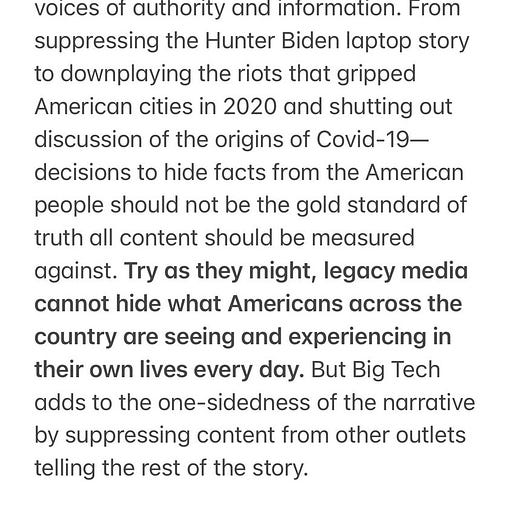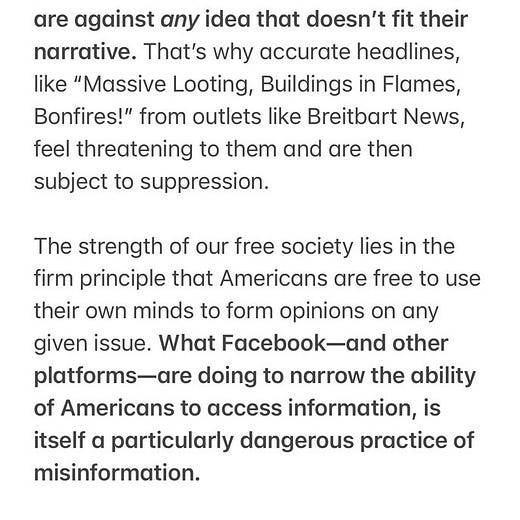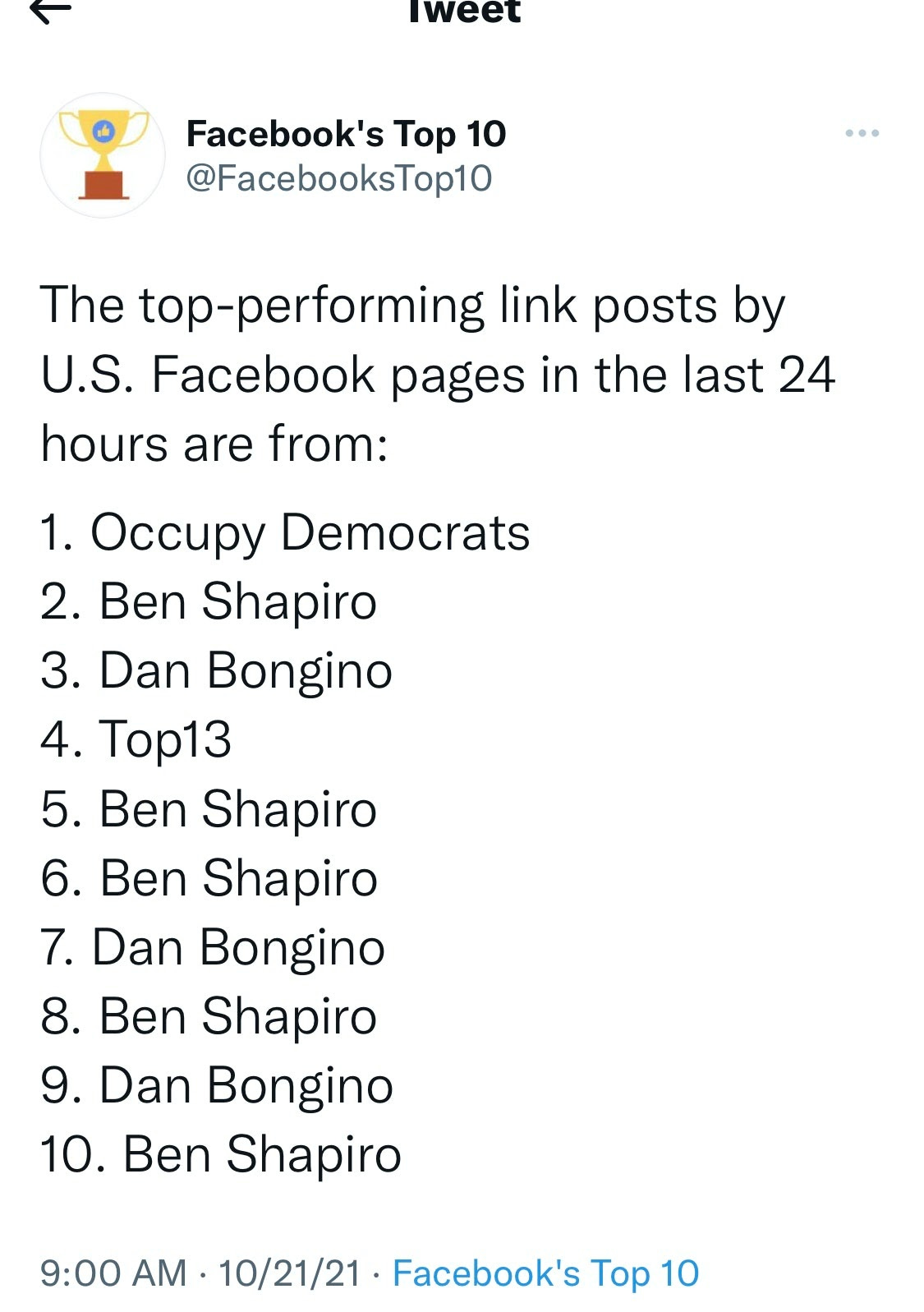Time to Move Fast and Break (Up) Facebook
This might be our last chance to do something about the dangers of Facebook before its too late
I spent the last several days poring through troves of stories about Facebook which emanated from the documents released by Frances Haugen, the former Facebook employee turned whistleblower. Each compounding story paints a more grim picture of the Silicon Valley behemoth. Fomenting genocide, radicalizing people, enabling human trafficking, siding with authoritarian governments, damaging, teens, ignoring warning sign after warning sign about the planning of the Capitol insurrection. Haugen’s documents and other independent reporting expose Zuckerberg as a megalomaniacal micro-manager operating with a combination of avarice, cowardice, and incompetence.
It is hard to conjure another private citizen or company who has hurt more people in recent memory than Mark Zuckerberg and Facebook. This is not my view. Or the view of reporters and anti-Facebook activists. According to the documents, the most dire warnings about the dangers of Facebook are coming from Facebook employees concerned about their inability to control the monster they helped create.
While reading these stories, I can’t help but worry that despite the furor against Facebook, the moment will pass and little to no action will be taken; and while Facebook is weakened by this public outrage, Mark Zuckerberg and his minions will continue to make gobs of money destroying American democracy and sowing anger and dissent across the planet.
This disastrous outcome felt inevitable when Facebook announced its earnings on Monday afternoon. While the period covered by the announcement did not include the last few weeks of scrutiny, Facebook made $28.2 billion last quarter, a 33 percent increase over the previous year.
I worry that if society doesn’t do something about the Facebook problem right now, while we have the world’s attention, nothing will happen.
Understanding the Facebook Papers
The scope and scale of insider information about Facebook coming to light in recent days is mind-boggling. As a person that pays attention to political news as a profession, I found it nearly impossible to track everything. As my Pod Save America cohosts pointed out in Tuesday’s episode, the release of these documents was designed to appeal to reporters, not to drive home a coherent message about the dangers of Facebook and the culpability of the people working there. As an example, the original series of disclosures published by the Wall Street Journal was called the “Facebook Files.” The current set published by a large consortium of media outlets was dubbed the “Facebook Papers.” This is more evidence there is no industry worse at marketing its own product than the traditional media — a fact that is probably related to their rapid decline in influence and financial viability in recent years.
There is no question. People who engage with the news take away that Facebook is bad, but what gets lost is how Facebook rose in its influence, why we allowed it to do so, and what can be done about it.
Fortunately (for us), a number of very smart reporters and writers processed their revelations, put them in context, and summarized the findings in useful, easily understood ways. To that end, I would recommend reading:
“Five Things You Should Know About Facebook” by Judd Legum, Popular Information
“History will Not Judge Us Kindly” by Adrienne LaFrance, The Atlantic
“So...what now?” by Charlie Warzel, Galaxy Brain
“Five points for anger, one for a ‘like’: How Facebook’s formula fostered rage and misinformation” by Jeremy B. Merrill and Will Oremus, Washington Post
And if reading those stories is too much of a burden, here’s a TL;DR:
Mark Zuckerberg, Sheryl Sandberg, and the rest of the folks at Facebook created a monster they cannot and do not want to control and turned a blind eye to a series of atrocities in order to make themselves even richer.
I am not arguing that Facebook will come out of this crisis unscathed or stronger than before, but its reputation is irreparably damaged. It will be harder to recruit and retain top talent. Facebook struggled in recent years to work with brands and influencers because the platform is seen as stodgy and lame. Those sorts of partnerships will be impossible now that the company is a genocide-enabling pariah. Over time, the company will likely die a slow death driven by bureaucratic inertia, brain drain, and an entrenched leadership with a bunker mentality. But that is cold comfort. The world doesn’t have time to wait for Facebook to go away on its own. The next pandemic will be dramatically worse because of how Facebook helped spread vaccine misinformation during COVID-19. Odds are the next election will end in violence because of how Facebook fueled conspiracy theories during this one. Our ability to confront existential threats like climate change will be severely hampered because of the division encouraged by Facebook’s algorithm.
This is the moment to do something. And as it is with climate change, this moment may be our last chance.
Why Now?
The urgency of immediate action has less to do with taking advantage of the current attention on Facebook and more to do with this possibly short-lived moment of unified Democratic government.
There is no easy solution to the Facebook problem. One thing is clear from the “Facebook Papers.” Facebook cannot be trusted to fix itself. Mark Zuckerberg owns enough shares of the company that he cannot be fired or removed for any reason. Therefore, we need government action to rein in this out-of-control behemoth.
There are a number of ideas circulating about how to deal with Facebook, social media, and the problems of Big Tech more broadly:
The Securities and Exchange Commission can undertake an investigation to see whether Facebook misled investors. Such an investigation appears to be one of Haugen’s goals as she submitted the documents to the SEC. If found guilty, the agency could impose fines, restrictions on how the company operates, and potentially seek Zuckerberg’s removal.
The Federal Trade Commission already sued Facebook for violating anti-trust laws. One possible result could be breaking up Facebook. Perhaps having two of the world’s largest social media platforms and the world’s largest messaging platform under the control of one man-child that can’t be fired is a bad idea.
The FTC’s hand can be strengthened by congressional action. Senator Amy Klobuchar is looking at tough anti-trust legislation in the Senate. There is a package of bills in the House that, according to Accountable Tech, anti-Big Tech advocacy group, would:
Ban companies from self-dealing and rigging the marketplaces they operate
Prevent companies from buying up potential competitors
Force companies to sell off lines of business that create conflicts of interest
Empower users to take their data, leave dominant platforms, and interact through competing platforms
Fortify the underfunded agencies that defend consumers from Big Tech’s abuse
While Republicans love to shed crocodile tears about Big Tech, they are even less likely to take on Facebook than Zuckerberg himself. Just look at this absurd response to the “Facebook Papers” from House Minority Leader Kevin McCarthy:
McCarthy, a wholly unserious human, is being willfully dishonest here. The “Facebook Papers” say the exact opposite. Facebook repeatedly broke its own rules to protect Donald Trump, Republican politicians, and Right-Wing media outlets like Breitbart. Republicans won’t fix Facebook because Facebook is their strongest political weapon by far. Disinformation and division is their primary political strategy. And that strategy cannot succeed without Facebook. Even minor changes to the algorithms could neuter Republican messaging. Look at the content dominating Facebook on one day last week:
Why would the Republicans ever change such an effective message delivery system? They want to rail about Big Tech and play the victim while also having Big Tech do their dirty work.
As usual, the only people who might take on a big problem are Democrats. The window for real action is narrow, given a looming election that may cost us our majorities in the House and Senate. It’s our responsibility. If we don’t do it, no one will. And if we don’t do it now, we may never get another chance.








Dan, I agree that we have to strike while the iron is hot. But unless advertisers go back to boycotting Facebook, there's little chance of change there. A bunch of leading civil rights groups organized the #StopHateforProfit advertiser pause back in July 2020, which got Zuck and Sheryl's attention, but they rode it out. Now the only initiative I see to organize pressure for change is TheFacebookLogout, which I'm (a small) part of and which I wrote about here yesterday https://theconnector.substack.com/p/its-time-for-the-great-facebook-logout. It's very hard to get individuals to take this action (Facebook is our de facto digital phone book after all, like a social utility you can't do without) so I don't expect the logout to last long, but it could help us organize the kind of broad grassroots base needed to pressure advertisers and also hold Congress' feet to the fire. Lastly, I don't think breaking up Facebook alone into its major parts would fix the problems that have been identified--we need far greater transparency into how these platforms work to amplify content and group formation, and with that, we can push for a bunch of guardrails to reduce or eliminate toxic effects.
I nominate Zuckerberg for the Fritz Haber award. That award was initiated today, and the winner each year is the person who most closely exemplifies this dilemma: when you weigh that person's life in the balance, good and bad, is it very hard to determine if the world would be better off had he or she never been born? To explain:
Haber was a very famous German chemist and inventor in the late 19th and early 20th centuries.
In 1905 Haber reached an objective long sought by chemists—extracting large quantities of nitrogen from the air. Nitrogen gas is abundant in the atmosphere, but its solid form is relatively scarce on earth. It is inert and does not react with other chemicals to form new compounds, and so the various methods to extract it failed miserably over the years. Haber invented a process using high pressure and a catalyst and was able to directly react nitrogen gas and hydrogen gas to create ammonia. BASF licensed the process, brought it to industrial scale, and thus developed the base material for artificial fertilizer. And the same ammonium nitrate was the basis for producing munitions for the German during WWI.
Haber’s breakthrough enabled mass production of agricultural fertilizers and led to a massive increase in growth of crops for human consumption. So important is his fertilizer, that agronomists today say that without it--relying solely on manure-based fertilizers--farming would not support a world population greater than two-and-a-half billion people, less than a third of today's population.
But... he and the institute he led next turned their attention to creating poison gas. Their first attempts led to Chlorine Gas, which Haber got permission to use against entrenched French and Belgian troops at the battle of Ypres in 1915. He supervised its use personally and was delighted with the results when it blinded and suffocated its victims. Haber was given a commission of captain in the German Army, and returned to his villa for a celebration. During the celebration, his wife, also a well-known chemist, continued their long-running argument about his increasing militancy. She committed suicide in their courtyard garden, in front of him (and unwittingly, also in front of their 10 year old son, watching from a window. Haber returned to the reception.
Haber won the Nobel in Chemistry in 1919. It is undisputed that 2 of 3 people alive today owe their existence to Haber. But he wasn't finished. In the early 1930s, Haber was invited to become a senior member of I.G. Farben. Following up on his process to create the raw materials for fertilizer, he and his team developed a pesticide based on the poison cyanide. It was powerful and cheap, and could be stored in crystal form, gasifying when exposed to air, perfect for delousing and decontaminating buildings, ships, etc. He named it Cyclone. Or in German, Zyklon. Haber died in 1934, but his invention, later improved and re-named Zyklon B, was used for mass murder of Jews and others in WWII.
Haber and his wife were both Jewish. Their son committed suicide in his twenties.